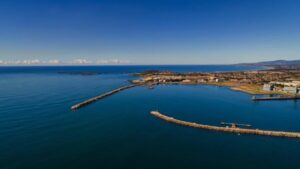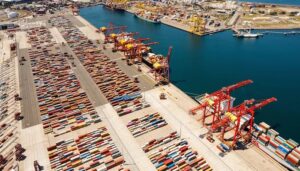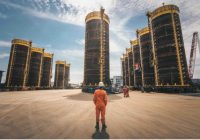NSW Ports is championing decarbonisation, sustainable development and ongoing support for community engagement and investment in its new Sustainability Strategy.

The strategy published today also commits NSW Ports, which manages the State’s key trade gateways of Port Botany and Port Kembla, to building resilience in a changing environment by responding to the business-related risks of climate change.
NSW Ports CEO Marika Calfas said the Sustainability Strategy built on the company’s achievements to ensure it remained highly resilient, responsive and responsible in its operations.
“We all have an important role to play in actively working toward a better future for the environment, the economy and our society. Sustainability is essential not only to our business but to the success of the industries and communities with which we work,” she said.
“Our key trade gateways at Port Botany and Port Kembla contribute more than $13 billion annually to the NSW economy and support about 65,000 jobs. As a critical node in the national economy, we are committed to decarbonising our own operations and working collaboratively with other organisations to support decarbonisation across the supply chain.”

NSW Ports’ Sustainability Strategy builds on its target of net zero Scope 1 and 2 greenhouse gas emissions by 2025, with commitments to use 100 per cent renewable electricity and to work with tenants and customers across our port precincts in the implementation of their decarbonisation roadmaps. The strategy also includes NSW Ports’ commitments to:
- Ensure 100 per cent of developments at its ports and intermodal centres comply with a sustainable development code
- Improve efficiency and environmental outcomes by shifting more goods from road to rail
- Implement a sustainable procurement procedure and supplier code of conduct to help decarbonise the supply chain
- Invest in smart technology to monitor and manage environmental factors, such as noise and weather, across its assets
- Promote reconciliation with local First Nations communities
- Continue its community engagement and investment program, which has supported more than 30 community groups over the past three years
- Ensure staff feel engaged, included, and supported in the workplace
- Develop a monitoring and evaluation framework to accurately measure strategy progress.

“Sustainability is no longer solely synonymous with environment. While our plan proudly includes decarbonation targets, being a world-class port with climate resilient infrastructure, championing sustainable growth and supporting our local communities, are all important,” Ms Calfas said.
You can read more about NSW Ports’ Sustainability Strategy here.











